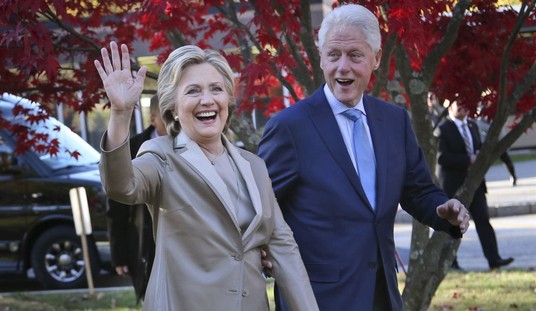=========
=========
Promoted from the diaries by streiff. Promotion does not imply endorsement.
=========
=========

** FILE ** Brett Kavanaugh appears before the Senate Judiciary Committee on Capitol Hill April 26, 2004, on his nomination to be U. S. circuit judge for the District of Columbia Circuit. Kavanaugh’s nomination by President Bush to a federal appeals court judgeship is moving toward a vote in the Senate after being blocked for more than two years by Democrats. (AP Photo/Dennis Cook, File)
If one asked a liberal strategist their opinion on President Donald Trump’s recent Supreme Court nomination, the lyrics to R.E.M.’s “It’s the End of the World as We Know It,” might be their retort. The vitriol-fueled reaction to Trump’s stellar pick, Brett Kavanaugh, is crazed, if not expected. From political figures such as Sen. Patty Murray (D) and commentator Eric Holthaus to Hollywood hacks such as Joss Whedon and Rob Reiner, the left has exploded into a Kavanaugh-induced fireball. However, the question remains: Is Brett Kavanaugh a threat to the Constitution?
The Supreme Court has a sordid history of betraying the values in the Constitution. One of the more notable, if obscure, rulings in violation of constitutional ideals was the precedent-setting case Wickard v. Filburn. In 1942, farmer Roscoe Filburn exceeded the wheat allotment established in the Agricultural Adjustment Act (AAA). Filburn contested that the excess wheat was for private consumption and therefore could not be regulated by the federal government. Unfortunately, the Supreme Court ruled against Filburn, stating that all commerce, even private consumption, falls under the jurisdiction of the federal government. According to the landmark ruling, the court broadly interpreted Constitution’s Commerce Clause, which vastly increased the federal government’s regulatory powers.
Regrettably, the ruling vastly expanded the definition of “commerce,” giving the federal government virtually complete authority to regulate all economic activity in the nation. However, the Constitution was meant to limit federal authority, not expand it. By broadly interpreting the Constitution, such as in Wickard v. Filburn, the Supreme Court grants the federal government powers that the Founding Fathers never intended. According to the Commerce Clause, Congress has the power to “regulate Commerce with foreign Nations, and among the several States, and with the Indian Tribes.” An accurate reading of the clause would have been that the federal government has no business regulating the amount of wheat an individual farmer grows for his personal consumption.
After the groundbreaking Fillburn ruling, the Supreme Court has continued to expand federal power at the expense of individual freedom. In 1968, the case of Jones v. Alfred H. Mayer Co. reached the nation’s highest court. This case involved a dispute between Mayer’s real estate company, which refused to sell a home to Mr. Jones. Consequently, Jones sued Mayer, claiming racial discrimination because he was African American. The ruling, coming in the midst of the civil rights movement, further reduced personal freedom. In essence, the court granted the federal government the power to dictate to private entities who they “must” do business with. The shock waves from this case are still evident today, especially concerning religious liberty.
Another blow to freedom courtesy of the Supreme Court occurred in its 1984 ruling in Chevron USA v. Natural Resources Defense Council. At issue was the Clean Air Act Amendments, which allowed the Environmental Protection Agency (EPA) to issue rules that superseded state and local laws. The court, siding against Chevron, thus granted an administrative agency (EPA) the power of lawmaking. The ruling eviscerated concepts such as the separation of powers and federalism, opening the door to the “deep state” and the explosion of rules and regulations issued by executive agencies that continually degrade freedom.
The answer to the question: Is Brett Kavanaugh a threat to the Constitution? A resounding no! Justice Kavanaugh, if confirmed, would not present a clear and present danger to the Constitution. Rather, the real and imminent threat to freedom in the United States comes from activist judges who impose their will on the Constitution. Those fearmongering that Kavanaugh on the Supreme Court would jeopardize freedom have it backwards. According to Kavanaugh, “My judicial philosophy is straightforward. A judge must be independent and must interpret the law, not make the law. A judge must interpret statutes as written. And a judge must interpret the Constitution as written, informed by history and tradition and precedent.” Fear not, having Kavanaugh on the Supreme Court will help ensure the Constitution is upheld and freedom in preserved.
Liam Sigler is an intern in The Heartland Institute’s Publications Department.












Join the conversation as a VIP Member